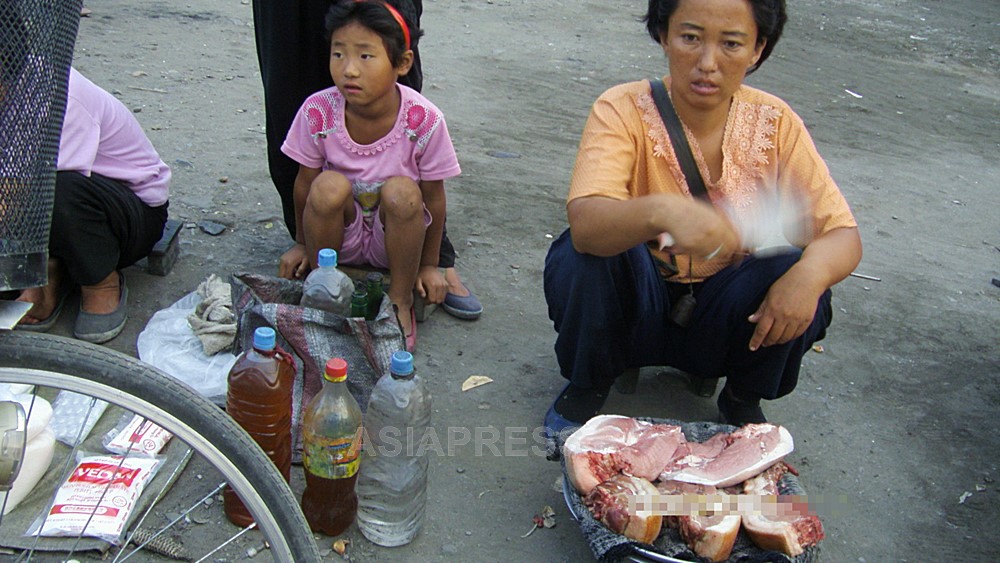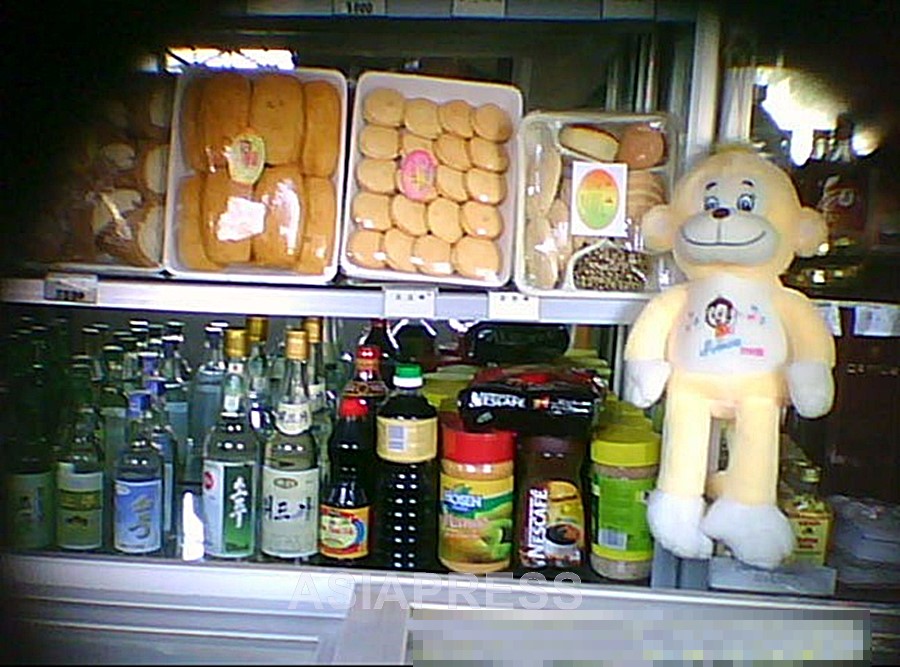
Starting this autumn, North Korean authorities began calling the manufacturing of homemade alcohol an “anti-state act” and launched a major crackdown on producers. As a result, the price of alcohol has skyrocketed, and there are now alcohol producers who are trying to avoid crackdowns by the authorities by manufacturing alcohol deep in mountains or in remote areas. (KANG Ji-won / JEON sung-jun)
◆ Order handed down to neighborhood watch units says that alcohol production is an “anti-state act” that helps the enemies’ sanctions against N. Korea
In mid-November, a reporting partner in Yanggang Province told ASIAPRESS that the authorities had handed down an order saying that there is a complete ban on illegal alcohol manufacturing, which they referred to as an “anti-state act.”
“The authorities handed down the order on November 4 saying that because most (homemade alcohols) are made of corn, the act of manufacturing alcohol with grain supplies is an anti-state act that supports the enemies’ sanctions on the country.”
As this suggests, the reason the authorities are reacting so sensitively to the illicit manufacturing of alcohol is because they believe that the producers’ use of grains, which the government has recently moved to intensify control over, is a waste and serves as a threat to the country’s already short supply of food.
According to the reporting partner, agencies tasked with cracking down on illegally brewed alcohol informed neighborhood watch units that anyone found to be illegally producing alcohol will face at least three months at a short-term forced labor camp to show that the government does not forgive anyone who makes money from producing alcohol from grains.
The reporting partner said that the government made several arrests to show it means business: two members of street-level enforcer teams who failed to stop the production of homebrewed alcohol after receiving bribes were punished, while two officials working at a city construction office were fired for secretly acquiring 10 liters of illegally brewed alcohol.
*Neighborhood watch units are North Korea's lowest administrative units and are typically made up of 20-30 households.
*A "forced labor brigade” is a "short-term forced labor camp" where those who are deemed to have disturbed the social order, disobeyed the authorities, or committed minor crimes are detained without judicial procedures and sentenced to forced labor for up to one year. These camps are in cities and counties throughout the country and are managed by the security bureau (police).
*Street level enforcer teams are mobilized on a temporary basis to conduct surveillance and crackdowns on people to ensure they abide by social norms.
*City construction offices are North Korean government agencies tasked with managing construction projects and maintaining and repairing buildings.

◆ Two reasons why the Kim Jong-un government is harshly cracking down on illegal alcohol
Even in the past, North Korean authorities conducted crackdowns on illegally produced alcohol; however, there appears to be two major reasons why the government has moved to take unprecedentedly strong action against alcohol producers. The first reason is, as mentioned before, the concern that the use of corn for alcohol will damage the government’s efforts to distribute and monopolize the country’s already lacking food supplies. In short, the government intends to monopolize the supply and management of food and is aiming to prevent state food supplies from being used by illegal alcohol producers.
The second reason is that the Kim Jong-un regime aims to monopolize control over the distribution of consumer goods, an effort that has continued since the start of the pandemic. In other words, the regime’s new policy is to exert comprehensive control over the production, transport, storage, and sales of consumer goods.
As all this suggests, the government has revealed its desire to prevent individual business people from managing the production, distribution and sale of popular consumer items such as alcohol. This can be evidenced by the fact that the regime cracks down hard on illegal producers of alcohol but continues to allow the legal sale of alcohol at state-run stores and markets.
◆ People are discontented by rising alcohol prices due to crackdowns
According to the reporting partner, one bottle of illegally produced alcohol has skyrocketed in price from 1,800 won to 3,000 won due to intense crackdowns by the authorities. A bottle of alcohol sold legally, meanwhile, is still expensive, going from 3,500 to 20,000 won. All of this has led to growing discontent among ordinary consumers, the reporting partner said.
“The alcohol sold by the government is so expensive that it is difficult to buy, and the authorities are cracking down hard on other means of obtaining alcohol. I heard that in early November, a store was robbed in one of the city’s districts, with the thieves taking all of the alcohol on display.”
*1,000 North Korean won is about 158 South Korean won.
The reporting partner said that there’s been a rise in the number of women drinking alcohol after the intensified crackdowns; perhaps as a result, the Socialist Women’s Union of Korea recently emphasized in lectures and criticism sessions that drinking alcohol causes all sorts of diseases and even negatively influences the education of children.
* The Socialist Women’s Union is a social organization made up of mainly housewives.
◆ Demand for alcohol doesn’t fall despite crackdowns…people still continue to produce homemade brews
With the increase in crackdowns on illegal alcohol production, the push-and-pull between ordinary people and the authorities is growing in intensity. The crackdowns have led to an increase in demand for homemade alcohol and consequently a rise in prices, and some people have taken advantage of this situation to earn money.
Some people brewing alcohol illegally in the mountains and remote agricultural areas are selling their products on the sly to people they know. The authorities finally moved to respond to these sorts of secret transactions: anyone who reports an instance of someone selling illegally brewed alcohol will get five kilograms of corn as a reward.
“The government is not providing the reward; rather, officials give confiscated alcohol-making devices and corn to those who file the reports. After the order was handed down, people facing economic difficulties are going around trying to sniff out the smell of yeast, so nobody is even thinking about brewing alcohol on the sly.”
That being said, some illegal producers of alcohol are reducing the risks to their businesses by receiving payment or corn first and then making and distributing their alcohol. In short, the push-and-pull between the government, which aims to monopolize sales of alcohol, and ordinary people who want cheap sources of alcohol to drink, continues.
※ASIAPRESS communicates with reporting partners through Chinese cell phones smuggled into North Korea.
![<Inside N. Korea> The Deteriorating Plight of the People (2) Kim Regime Prioritizes Order Over Welfare [ISHIMARU Jiro]](https://www.asiapress.org/rimjin-gang/wp-content/uploads/2021/07/202107-dandong-03_logo-150x150.jpeg)

![[Video Report] What do the ordinary people eat in N.Korea? There are many types of food sold at hawker stalls. (Hawker stalls are individually owned food stalls)](https://www.asiapress.org/rimjin-gang/wp-content/uploads/2017/01/7777-150x150.jpg)






















